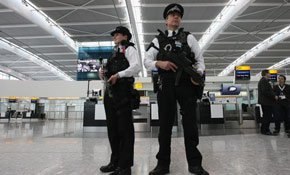John Humphrys asks: is the security state getting out of control?
The detention of a young Brazilian man for nine hours at Heathrow Airport on Sunday has raised widespread alarm about whether the police are abusing the powers given to them by anti-terrorism laws and whether those laws themselves are too sweeping. In particular the case seems to provide clear evidence that the powers are being used for purposes far beyond those for which they were intended, namely to protect us all from acts of terrorism. Is the security state getting out of control?
David Miranda, the twenty-eight year-old Brazilian, was in transit at Heathrow, travelling from Berlin to Rio de Janeiro. He was held under Schedule 7 of the Terrorism Act, 2000, which allows police at airports and ports to detain anyone for up to nine hours in order to investigate whether or not the detainee may be connected with any terrorist activity even when the police have no evidence nor even any suspicion that they do.
Speaking after his release and return to Brazil, Mr Miranda said: “There were six agents coming and going. They asked questions about my entire life, about everything. They took my computer, video game, mobile phone, my memory card. Everything. They were threatening me all the time saying I would be put in jail if I didn’t cooperate. They treated me like I was a criminal or someone about to attack the UK … It was exhausting and frustrating, but I knew I wasn’t doing anything wrong.”
What has made the case hit the headlines is that Mr Miranda lives in Brazil with his partner, Glenn Greenwald, the American investigative journalist responsible for reporting in the Guardian and the Washington Post the revelations provided by the American whistle-blower, Edward Snowden, about the mass surveillance of internet and phone communications by the American National Security Agency, part of the United States’ intelligence and security system, closely involved with Britain’s own intelligence arm, GCHQ.
Mr Miranda was returning to Brazil from Germany where he had been discussing the revelations with a film-maker, also working closely with the Guardian. On the face of it, then, it seemed that Mr Miranda was detained not because he was a terrorist suspect but because he was associated with those who have so embarrassed both the American and British governments by revealing the extent of their surveillance operations. This seems to many like a prima facie case of an abuse of the terrorism laws.
Lord Falconer, who was the Lord Chancellor in Tony Blair’s government and helped put the legislation on the statute book, said: “What Schedule 7 allows an examining officer to do is to question somebody in order to determine whether he is somebody who is preparing, instigating or commissioning terrorism. Plainly Mr Miranda is not such a person.”
Those alarmed by the case argue not only that it seems to be an abuse of powers but that also, as a consequence, that it undermines the faith people may have in such laws. Crispin Blunt, the Conservative former prisons minister, said: “using terrorism powers for something that doesn’t appear to be a terrorism issue brings the whole remit of the laws passed by parliament to address terrorism into disrepute.”
However, the Home Secretary, Theresa May, defended the police action. She said: “I think it is right, given that it is the first duty of the government to protect the public, that if the police believe somebody has in their possession stolen information which could help terrorists which could lead to loss of lives then it is right that the police act. That is what the law enables them to do.”
The Home Secretary’s defence of the police action rests on the possibility that material Mr Miranda might have had in his possession could have aided terrorists, but few people seem persuaded by this argument. Certainly the independent reviewer of terrorist legislation, David Anderson QC, has thought the case unusual enough to ask the police for an explanation. And one of Mrs May’s own Conservative colleagues, the backbench MP, Dominic Raab, thinks the motive for the detention was quite different. He said that the Home Office defence “suggests that the authorities picked Miranda up because he might have held further details (possibly gathered by the NSA whistleblower Edward Snowden) on US and British surveillance systems, disclosing the true scale of their snooping. In short a power to protect airports from attack has morphed into a shield to save governments from embarrassment.”
The Guardian itself was in no doubt what lay behind police action at Heathrow on Sunday. It wrote in a leader on Tuesday: “Mr Miranda’s detention was part security fishing trip, part police harassment exercise and part government warning signal to journalists and whistleblowers. It was an attempt to intimidate journalism in one of the zoned-off jurisdictional spaces where such a thing can happen without legal redress.”
Some, however, go further. They suggest that it is not just that governments may be prepared to use powers to save themselves from embarrassment but that, much worse, the granting of those powers has put those who use them beyond the control of democratic institutions, even, perhaps, of government ministers themselves. The columnist, Simon Jenkins, has written that what Snowden revealed “indicates not just that the modern state is gathering, storing and processing for its own ends electronic communication; far more serious, it reveals that this power has so corrupted those wielding it as to put them beyond effective democratic control. It was not the scope of NSA surveillance that led to Snowden’s defection. It was hearing his boss lie to Congress about it.”
The standard defence of state surveillance activity, one advanced by the Foreign Secretary, William Hague, is that innocent people have nothing to fear from it. But the anti-terrorism legislation itself, and especially the broad powers they give to the police, are already under attack and are to be subject to review. Dominic Raab argues that “well-intentioned but overly broad powers have been stretched to cover wider purposes, exposing ordinary people to arbitrary interferences. Over the past two years, Schedule 7 has been exercised to stop and question people a staggering 143,018 times – but there were just nine prosecutions and only five convictions. Not only does this suggest the power is being misused, it is a shocking waste of police resources.”
It seems likely that the length of time police will be able to detain people under Schedule 7 will be reduced from nine to six hours. But the Miranda case is likely to open a much bigger debate about our security state.
What lessons do you think should be learned from it?










